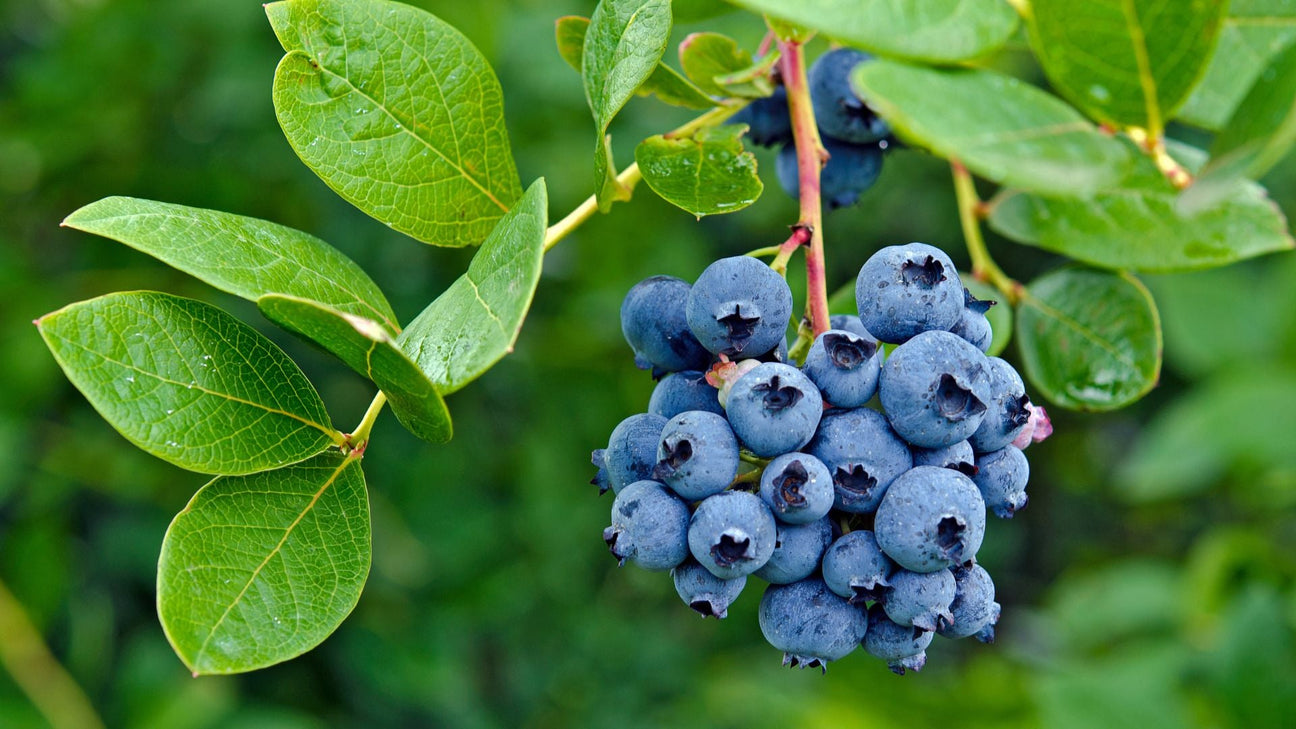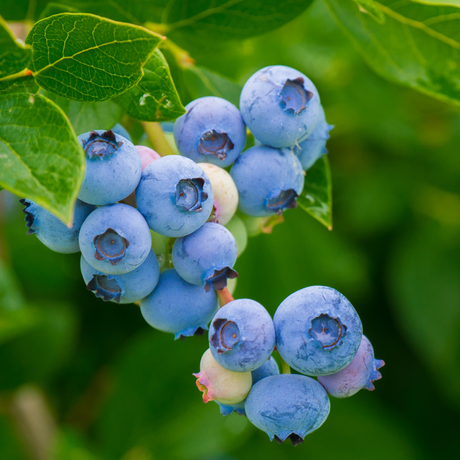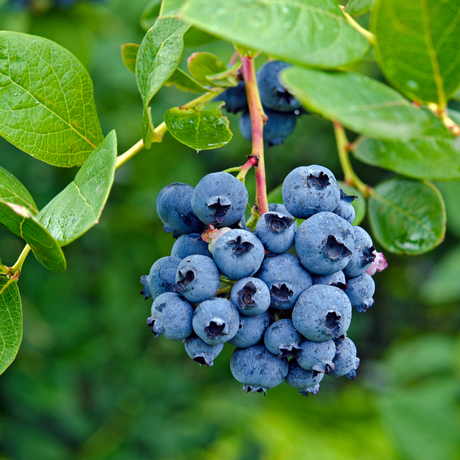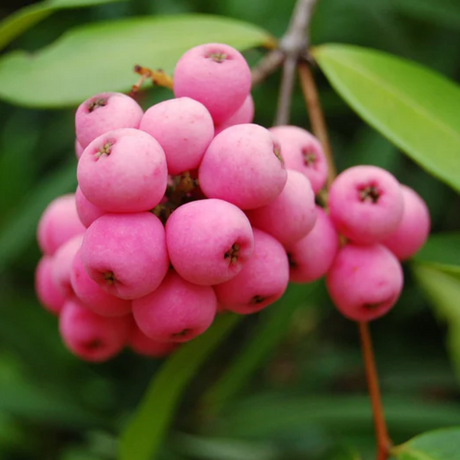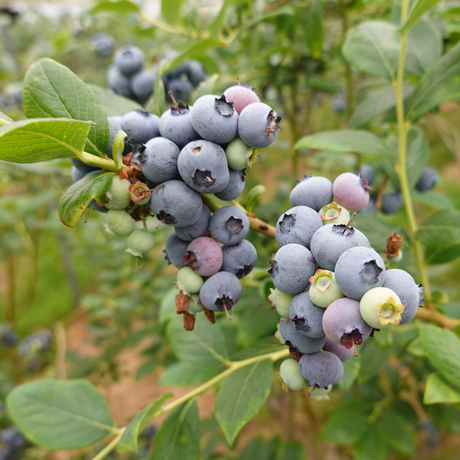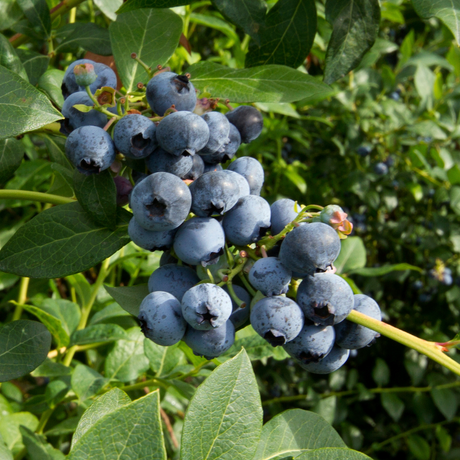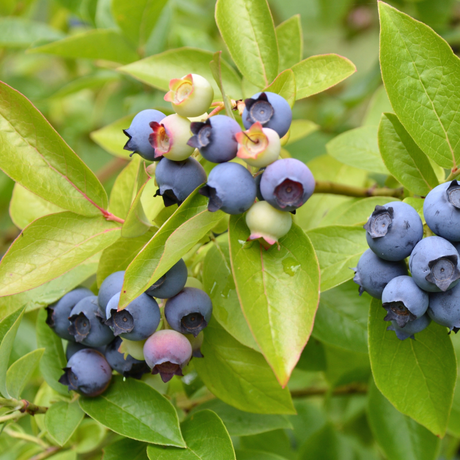Blueberry 'Bluecrop' Organic - Mid-season
Regular price 11,86Unit priceUnavailable- Regular price 11,86Unit priceUnavailable
- Regular price 11,86Unit priceUnavailable
Blueberry 'Brigitta Blue' BIO - Late
Regular price 11,86Unit priceUnavailableBlueberry 'Goldtraube' Organic - Mid-season
Regular price 11,86Unit priceUnavailableBlueberry 'Bluegold' BIO - Late
Regular price 11,86Unit priceUnavailable
Blueberry bush in picture
Ruud shows how he grows various berries and grapes in his garden.
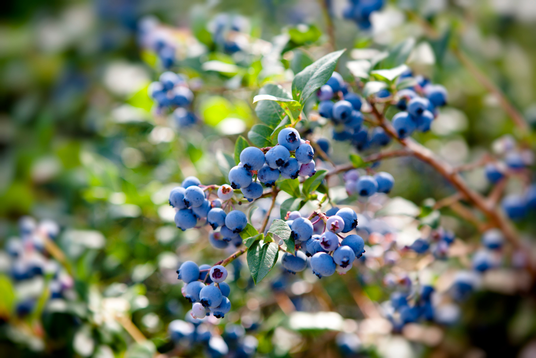
Also read our small fruit growing guide.
You may also like
View allBuying an organic blueberry bush: a juicy harvest, pure happiness
The blueberry is popular to grow, partly because it can be grown organically, without artificial fertilizers or chemical pesticides. In spring, the shrub blooms with beautiful white to pink flowers, while in autumn the leaves turn a striking orange-red and fall off. Various varieties of blueberry bushes are available, also suitable for small gardens or balcony boxes. The bush thrives in a sunny location and does best in moisture-retaining, acidic soil. Use a suitable fertilizer for optimal growth. Mulch helps retain moisture and suppress weeds. The blueberry bush is easy to grow, even for beginners.
An organic blueberry bush is more than just a plant: it's an investment in flavor, health, and gardening pleasure. The bush is self-pollinating and requires little care, making it ideal for any gardener. Flowering occurs in the first half of spring, when the bush displays beautiful white to pink flowers; this flowering is an important time in preparation for the harvest season in July and August. Flowering usually occurs in late spring, around May. Plant the bush in a sunny spot for best fruiting. The fruit, the blueberry, has a sweet flavor, a juicy texture, and offers many health benefits thanks to its rich vitamin C content. These berry bushes grow well in both open ground and pots, forming vigorous, hardy shrubs. Plukkers.com offers reliable, certified organic varieties that guarantee a bountiful harvest and vibrant autumn color.
Why an organic blueberry bush?
- Rich in antioxidants : Blueberries, also known as bilberries, contain valuable vitamins and are one of the top antioxidant berries. Organic blueberries can promote blood health due to their anthocyanin content.
- Enjoy fresh fruit : Nothing tastes as delicious as the sweet, juicy fruit of a home-grown blueberry – from jam to smoothies. The berries' firm yet tender texture contributes to their flavor and nutritional value.
- Sustainable choice : Organic farming supports soil life, bee populations, and your health.
- Organically grown : The organic blueberry is grown without artificial fertilizers or chemical pesticides, which ensures an environmentally friendly and healthy fruit.
- A stylish vegetable garden : The white bellflowers in spring and the red autumn leaves provide an aesthetic advantage.
Benefits of Blueberries
Blueberries in your garden? That's a real treat for yourself! Your blueberry bush (Vaccinium corymbosum) not only gives you a large harvest of those deliciously juicy berries—they're also packed with antioxidants and vitamin C. It's essentially a healthy snack from your own garden, what could be better? And what many people don't know: such a bush is also a sight to behold. In spring, you get those sweet white flowers, and in autumn, your plant surprises you with a beautiful orange-red fall color. By planting blueberries, you ensure you can enjoy your own harvest year after year and give your garden a nice boost—both for your eyes and your health. Regular watering is essential, especially during dry spells, as blueberries are sensitive to drought. Whether you choose a single bush or plant a whole row, your garden will simply be richer—more color, more flavor, and more vitality.
Our favorite varieties
There are several varieties of blueberries available, suitable for various gardens, including small ones. These varieties are characterized by their flowering in the first half of spring, with the shrub producing beautiful white to pink flowers in clusters on the branches. Blueberry harvest time is usually from June to August, depending on the variety.
- Blueberry 'Bluecrop' Organic
These medium-sized, slightly sweet berries appear in July, marking the harvest time for this blueberry. The Bluecrop is a self-pollinating, vigorous shrub with a high yield and beautiful white flowers during its spring bloom. After planting, it's important to prune the shrub, particularly removing thin branches, to improve air circulation and keep the shrub healthy. Prune annually in late winter or early spring to maintain good air circulation. The Bluecrop thrives in a sunny location in acidic, well-drained soil. - Blueberry 'Duke' Organic
An early variety: you can harvest large, mildly sweet berries as early as June. The Duke has sturdy branches and compact growth – ideal for smaller gardens. Pruning after planting is also important for this blueberry, removing thin branches to promote healthy growth. The Duke grows well in the right conditions and blooms with beautiful flowers in the first half of spring.
How to plant and care for the shrub
- Planting time : from September to March, outside frost.
- Location : full sun is preferred, but light partial shade is also allowed.
- Soil : Acidic (pH 4.5–5.5), airy, and rich in humus; consider peat moss or compost. Apply an acidic fertilizer annually, such as peat moss or a fertilizer specifically formulated for acid-loving plants, and ensure the soil retains moisture well for optimal growth.
- Planting distance : keep 100–150 cm between bushes.
- Water : Water consistently, especially during droughts and the first year.
- Prune : annually in late winter; remove old branches to keep the shrub vigorous. Pruning is best done between late November and mid-February. The blueberry bush is self-pollinating, so one bush is enough to produce fruit.
The blueberry bush requires little care and is easy to grow, even for beginners.
Combinations with other plants
Blueberry bushes are truly great team players in your garden! They make a wonderful duo with other berry bushes like redcurrants and gooseberries, giving you plenty of variety in your berry collection. They also look stunning among perennials and ornamental grasses, for example, as part of a colorful border that will make your neighbors jealous. Groundcovers like periwinkle or cranesbill create a cozy, vibrant base and keep the soil nice and moist – exactly what your blueberry bush needs. In the vegetable garden, they're ideal as edging or as part of a bird-friendly woodland planting (the birds love it just as much as you do). By varying the plants, you create a diverse and healthy garden that both you and nature can enjoy.
Harvesting and storing
- Harvest period : Blueberries are usually harvested in July and August, depending on the ripeness of the fruit. Bluecrop in July, Duke even as early as June. Protect the fruit well from birds, for example, with netting, to prevent them from eating the ripe berries.
- Uses : Eat fresh, in yogurt, pastries, jam, or smoothies. The texture of the berries is firm and juicy after harvest, which contributes to the flavor experience.
- Storage : kept cool, they will keep for several days; they can be frozen for winter use.
Reviews and experiences
If you plant a blueberry bush in your garden, you'll be pleasantly surprised by what you get. That abundance of juicy berries is simply fantastic, and then that beautiful autumn color – your garden suddenly takes on such a cozy atmosphere. The great thing is that it's easy to do: even if you're not very experienced with gardening, you can simply enjoy a bountiful harvest. Many people also plant other berry bushes or perennials alongside them, creating such a colorful and productive corner of the garden. All the positive stories we hear show that a blueberry bush is a truly smart choice if you're looking for something healthy, delicious, and beautiful for your garden.
Green pleasure for garden and table
An organic blueberry bush is a real asset to any gardening enthusiast. Thanks to organic cultivation methods, you can enjoy an environmentally friendly and pesticide-free plant. The bush not only produces healthy, nutritious fruit but also adds color and texture to your garden. The striking leaves turn a beautiful orange-red in autumn and then fall off, creating an extra visually appealing effect. Children love picking, and you'll be proud to share the fruit. Plus, the white spring flowers and red autumn leaves make this plant a seasonal treasure.

